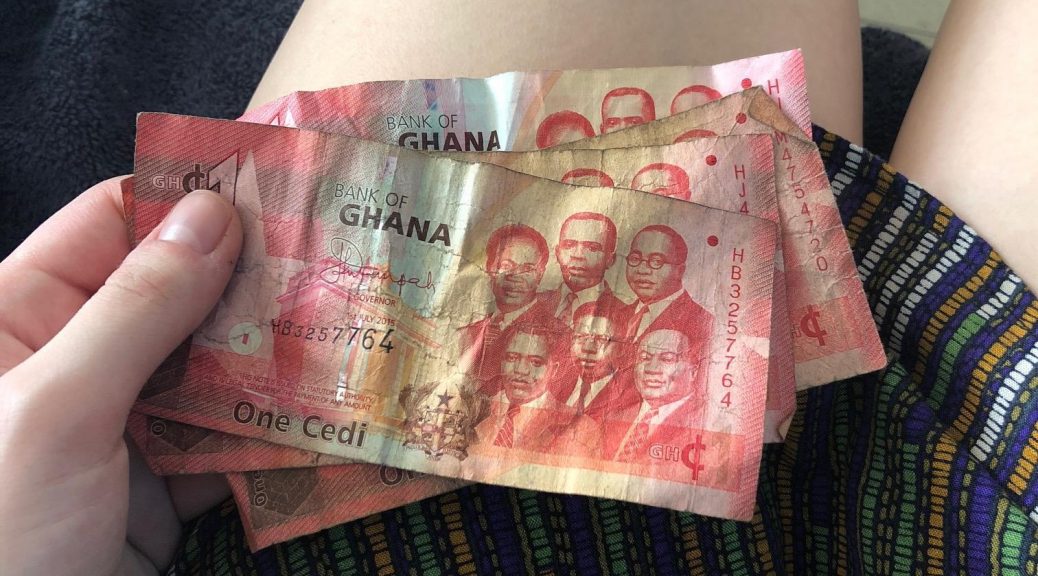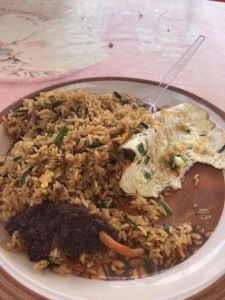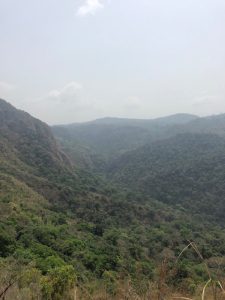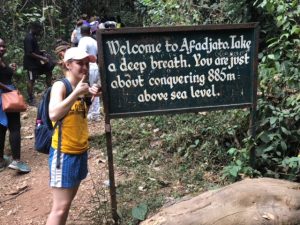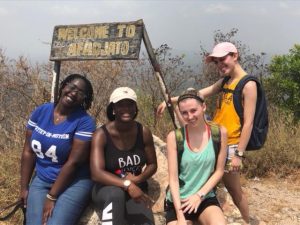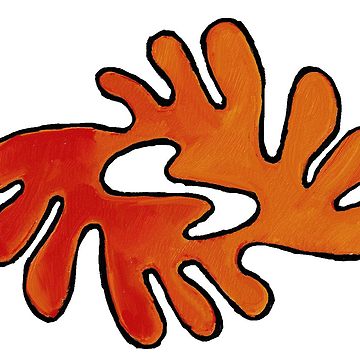
Bi Nka Bi – No One Should Bite the Other
At the edge of campus on the Wednesday before Easter, Phil, Elly, and I climbed into an SUV in our Sunday best. We were on our way to the wedding of someone named Ethan from Florida – someone none of us knew.
The driver of the SUV was a young woman named Selly. She wore her natural hair and was dressed in a white lace dress that starkly contrasted her smooth, dark skin. Her mother was in the passenger seat, also dressed in white. She plugged her iPhone into the center console and played Ghanaian pop music as we drove off campus. As we introduced ourselves from the backseat, I was struck by her sudden comfort with us, three young white people whom she’d never met. I grew to be equally comfortable with her on the short ride to the venue.
The event was a traditional Ghanaian engagement and marriage ceremony. It involves the groom-to-be and his family presenting gifts of food, drink, and cash to the family of the bride-to-be. Today, the groom was not Ghanaian, and neither was his family, but he still was presenting gifts in exchange for the bride’s hand. But his family remained in Florida – so who would be able to participate in the wedding?
TL;DR, it was his sisters Elly and Anna, and his brother Phil.
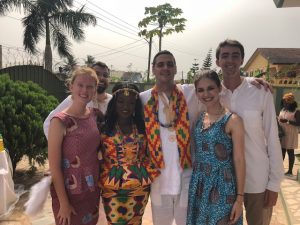
The long version is that the bride, Georgina, was friends with Selly, the woman who picked us up at campus, and Selly used to work in UG’s International Programming Offices, where USAC’s current resident director Abigail is stationed. Selly petitioned Abigail on behalf of Georgina for Abigail to send some American students to act as a surrogate family for the groom. Otherwise, Ethan would have no family who could present the wedding gifts. Got it? Ethan -> Georgina -> Selly -> Abigail -> Anna -> Elly, Phil.
Doesn’t matter. On the Wednesday before Easter, Anna, Elly, and Phil were adopted family members for Ethan from Florida.
Technicalities of the ceremony requirements aside, I ask you, dear reader, to imagine being in Ethan’s position. How would you feel coming to Ghana for the first time to get married? Would you invite strangers to be in your wedding party? Would you ask a stranger to become your sister, knowing that you might never meet again?
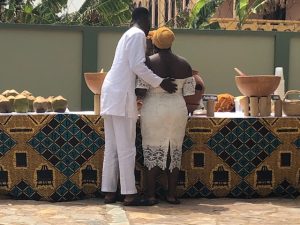
The ceremony was lively and loud and beautiful. The bride, Georgina, was dressed in a two-piece dress woven of multicolored kente, with jewelry around her neck and adorning her hair, and she was holding a fan made of white feathers. She took my breath away, and I bet Ethan felt similarly. We were invited to sing, dance, shake the hands of Georgina’s family, take photos with cousins and sisters, invited to a feast fit for royalty. And the event wasn’t in a banquet center or a huge garden – it was in Georgina’s family home.
Now, can you put yourself in this position? Your daughter is getting married to an American man whose ways of life are vastly different from your own. He isn’t familiar in the Akan marriage tradition, and yet he still wants to participate in one. What does it take for you to open your home to him and his (albeit, fake) family? To offer them food, welcome them into your home, dance and sing with them, add photos with them to the wedding album that you will show your future grandchildren?
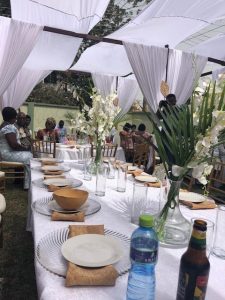
Phil, Elly, and I decided to leave the festivities just as the heat of the sun was becoming weak, around 4pm. I was full of fufu and jollof and sobolo with a huge smile on my face, and the three of us joked about the more bizarre aspects of the day as we waited by the house gate for Selly to come out.
She drove us to ISH and the drive back felt a lot longer than the drive there. As we left the car, I said yɛbɛhyia – see you later. Literally, it means “we will meet again.”
—————
Alone in my room, I sat in thought and wonder at the hospitality of everyone I’d encountered that day. The whole day had felt surreal, but comfortable. As Selly got to know me in her car, I felt appreciated. When Ethan asked me to fill the role of his sister, I felt honored. When Georgina’s family opened their doors to me, I felt accepted. I’d suddenly felt at home with this family I didn’t know and the family I’d just become a part of. What new kind of hospitality was this? There were no presuppositions, no judgments, no uncomfortable gazes – they welcomed me as if they had always known me as an intimate friend. Even the language of the Akan is welcoming: everyone greets you with akwaaba – you are welcome here; saying thank you, medaase, literally means “I lay at your feet;” yɛbɛhyia – we will meet again.
Can you put yourself in my position?
I navigate my small part of Accra with the language of laying yourself at a stranger’s feet, ensuring them you will always meet again. I cram myself in the back of a trotro with a stranger pressing their arm up against me. Strangers ask me where I’m from, asking me for my phone number so they can get to know me. Sometimes, men ask if I will marry them as I’m waiting in line to get lunch.
What do you do when socialization requires a level of intimacy with strangers that you’re not familiar with? When the friend of a friend of a friend asks you to pretend to be someone’s sister? When suddenly your understanding of personal space is inconsequential?
I am endlessly grateful that I am able to be here in Accra, but I think I am more grateful to those I’ve met along the way, whose attitudes of intimacy and hospitality have sometimes been challenging. I didn’t come here to be comfortable, so I don’t resist these challenges. Was Selly comfortable putting three American kids in her car to take them across town? Did Ethan get married in Ghana without his family present because it was more comfortable? Was it comfortable for Georgina and her family to open their home to American strangers? Maybe, maybe not. But what rises above insistence on personal boundaries and comfort is extending welcoming to strangers.
It might be hard for you to put yourself in my position. If it is, I challenge you to look more closely at Africans, at Ghanaians, at the city of Accra. They might be strangers to you, but they don’t bite. You are welcome here.
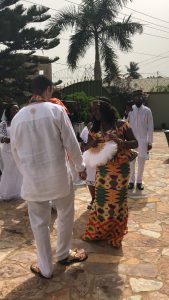
Yɛbɛhyia,
Anna
